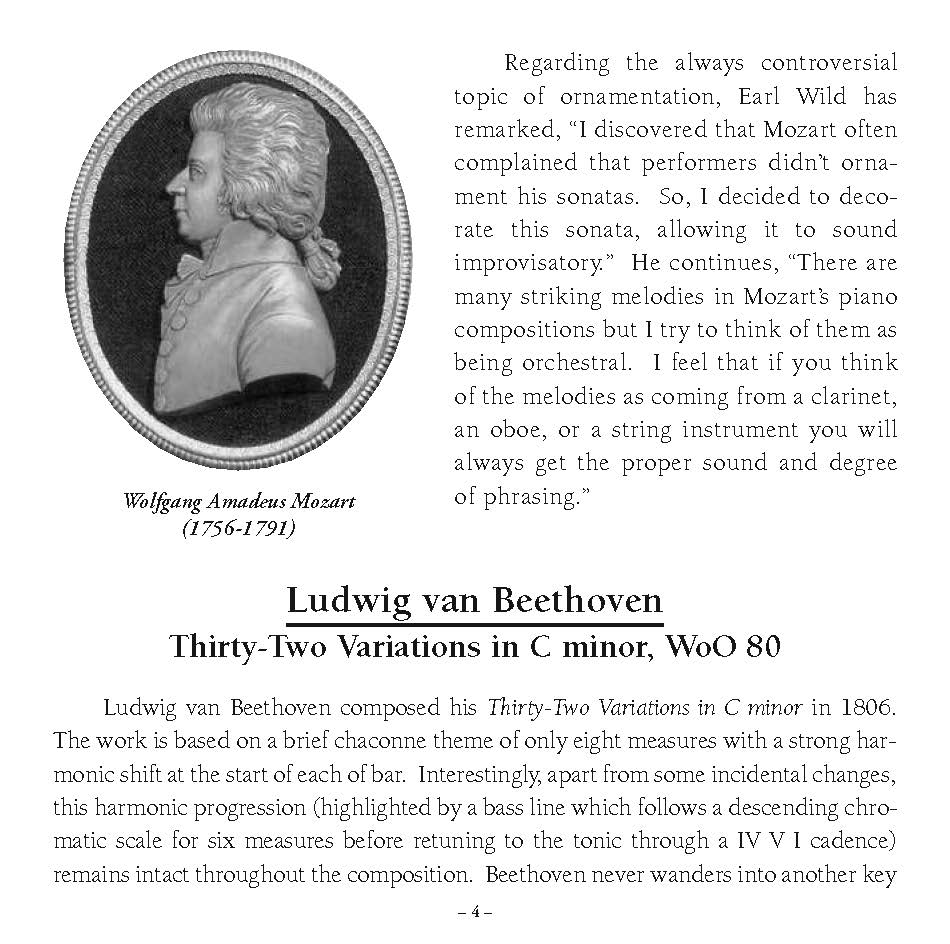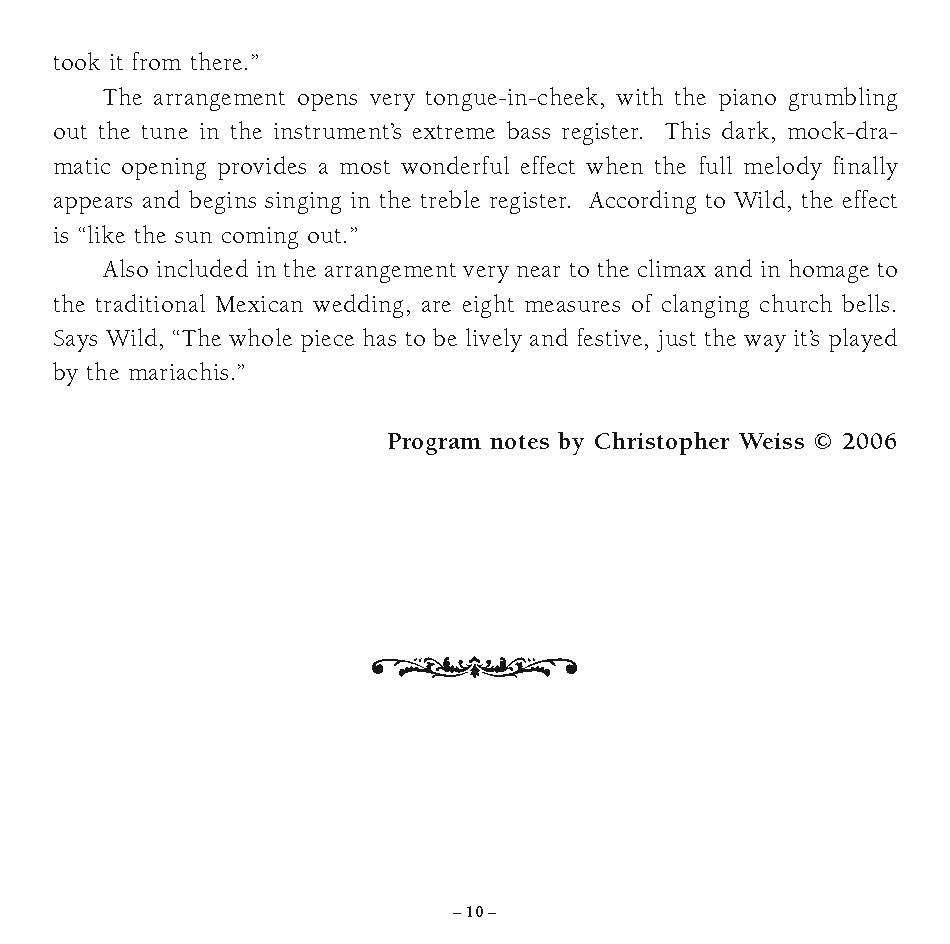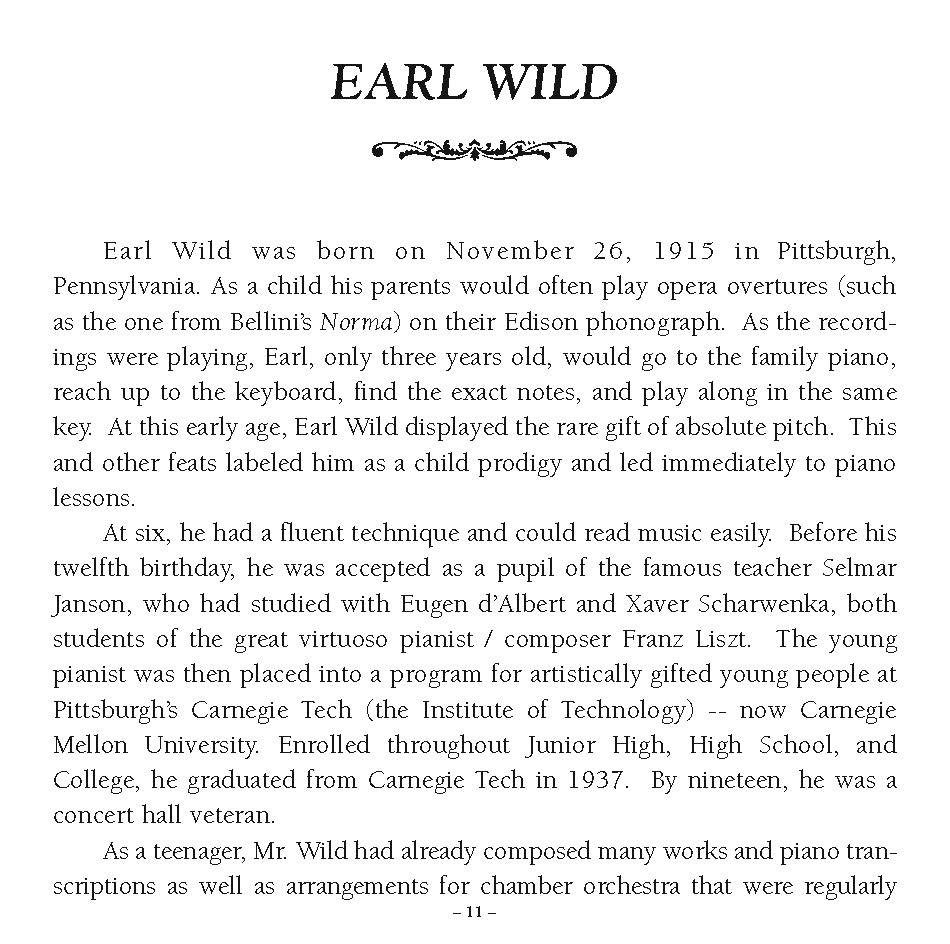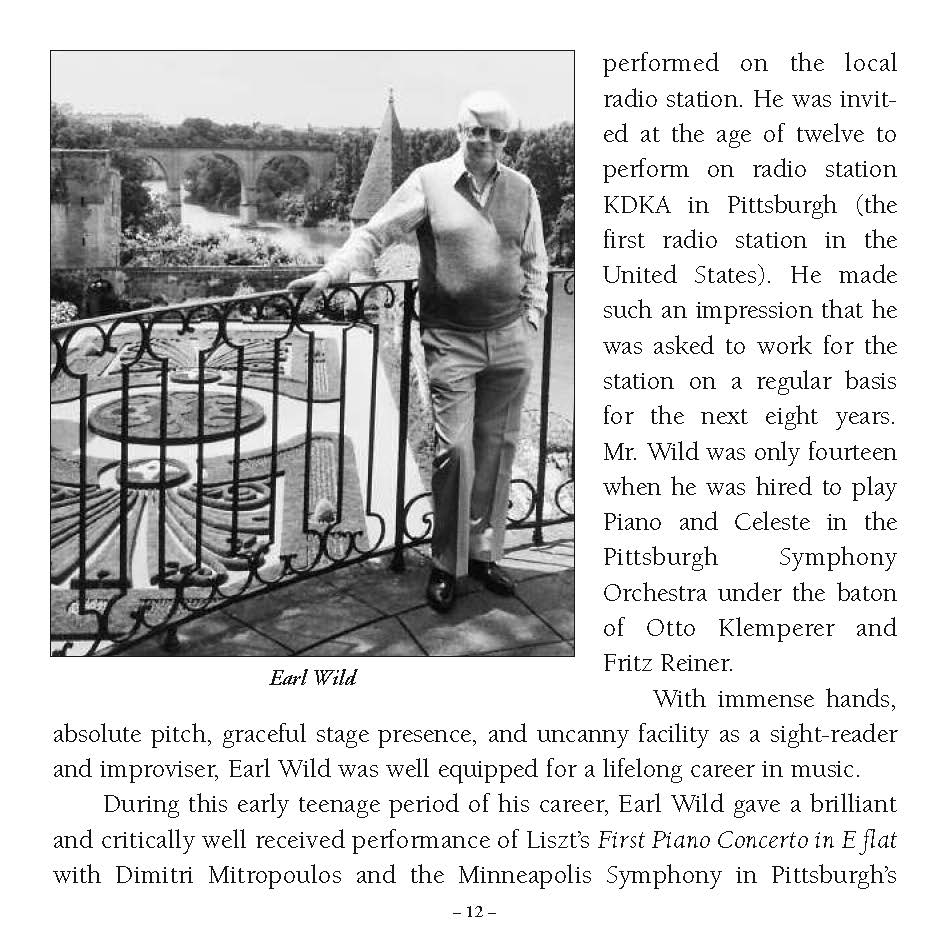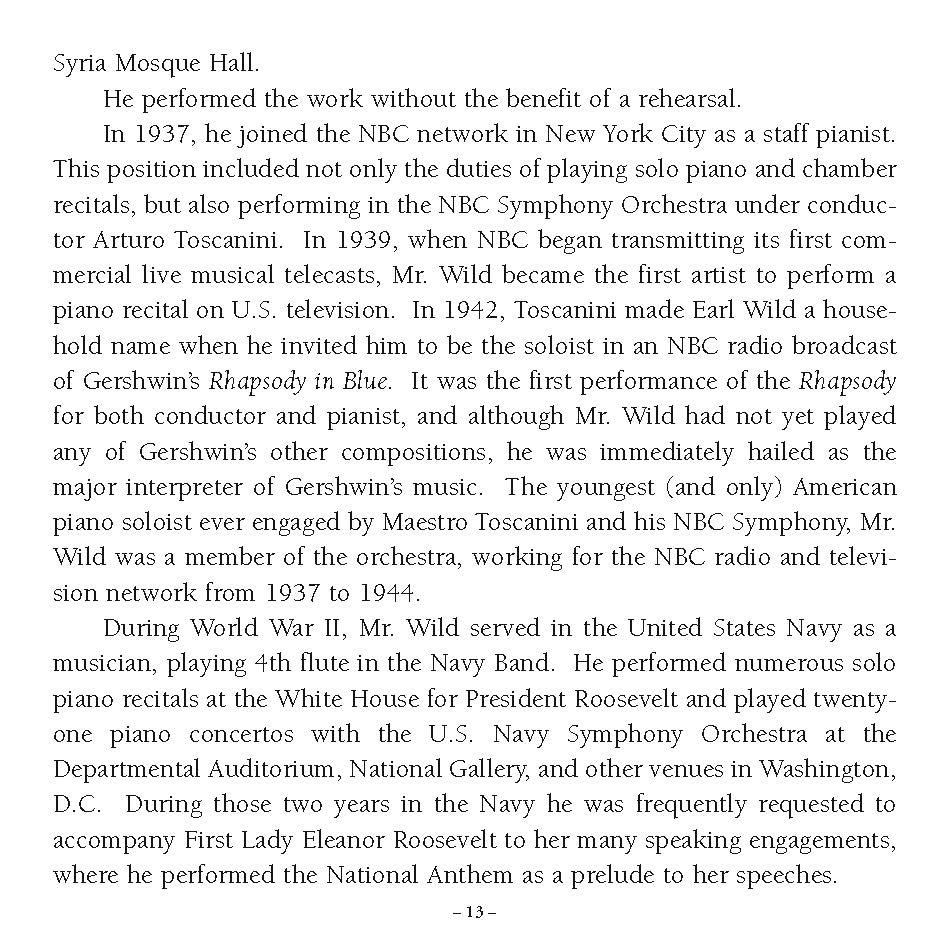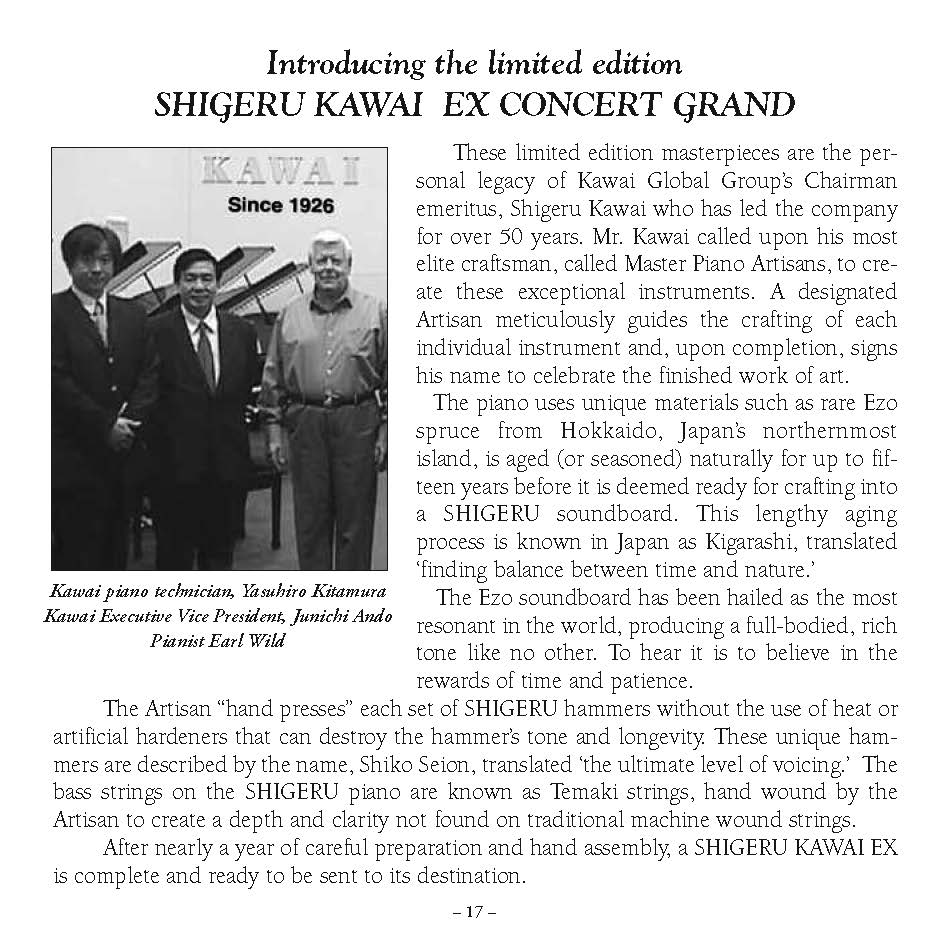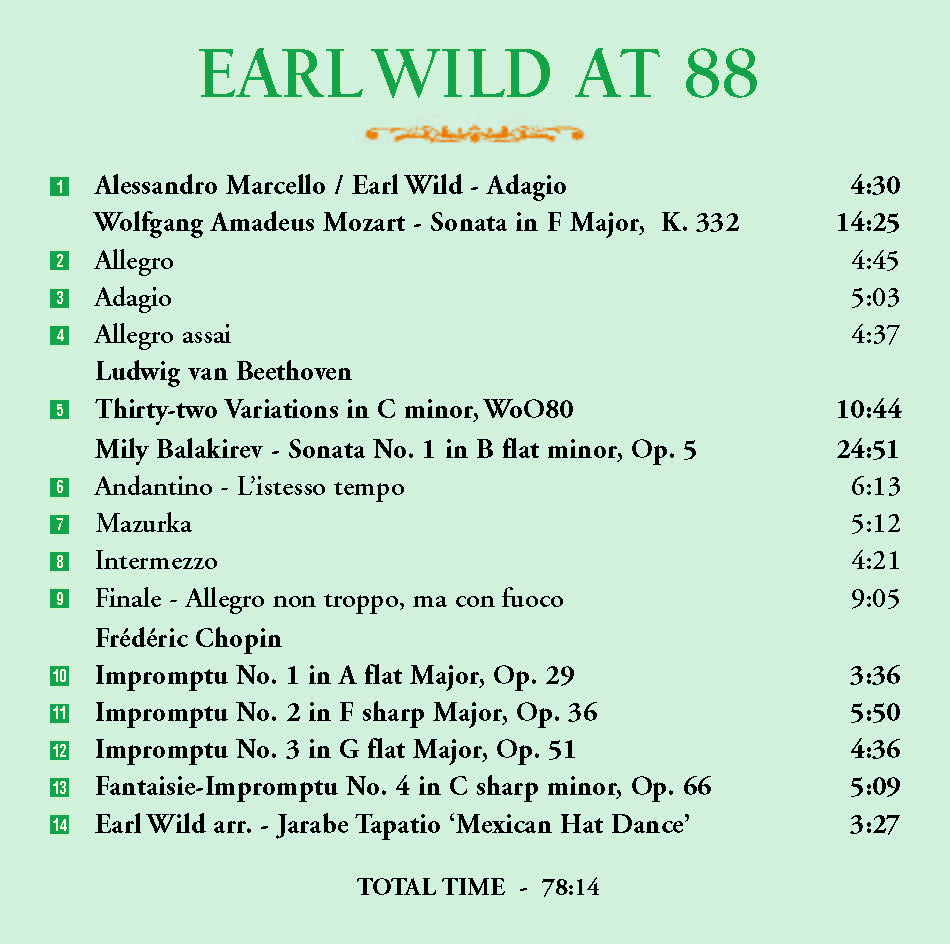1
/
of
20
Earl Wild At 88!
Earl Wild At 88!
Regular price
$10.00 USD
Regular price
Sale price
$10.00 USD
Unit price
/
per
Couldn't load pickup availability
Earl Wild At 88! This collection features an impressive array of finely-crafted classical music from one of the greatest 20th-century composers. Boasting an impressive and diverse repertoire, this musical compilation provides a unique opportunity for fans and music aficionados alike to explore the work of one of the greatest composers of the 20th century.
Ivory Classics CD-73005
EARL WILD AT 88!
Piano: Earl Wild
Producer: Michael Rolland Davis
Engineer: Ed Thompson
Piano Technician: Yasuhiro Kitamura
Total Time: 78:14
Recorded in Holy Trinity Lutheran Church, Buffalo, NY. May 11-14, 2003
Original 24/88.2 Master - Recorded direct to the SADiE Artemis 24-Bit High-Resolution digital workstation.
Piano: Shigeru Kawai EX Concert Grand
Liner Notes:Christopher Weiss
Design: Samskara, inc.
A new 24/88.2 High Definition recording. All pieces were recorded for the first time by Earl Wild. Four Chopin Impromptus, Balakirev's Sonata No.1, Beethoven's 32 Variations, Mozart's Sonata K.332, and Earl Wild's new arrangement of the Mexican Hat Dance (Jarabe Tapatio).
Disc.Reviews
Very few great pianists have the energy or technique in old age that they do in youth. Or so the phonograph starkly reveals, like a morning-after recording of a party the night before. Earl Wild, though, continues to defy this rule at the age of eighty-eight. He's also fortunate enough to have a recording company of distinction available to prove how good he still sounds. Judging from the results, we're fortunate, too.
The Mozart sonata conjures up the spirit of Clara Haskil-lyrical and clean, without being antiseptic. There is mock drama here, too, and protean wit, both given their due by Wild: listen to the garrulously fleet but gossamer phrasing in the last movement, for example. Wild also has the courage (so rare, nowadays) to perform the adagio at the proper tempo, thus allowing the movement's rare combination of sensuousness and grace to shine through.
That same quality, that ability to play slowly and simply - a very difficult thing to do, since it reveals the musician's technical flaws under a magnifying glass - also appears in the gravely beautiful Marcello Adagio; while the Beethoven Variations possess the dramatic and coloristic reserves of a Cherkassky.
The Balakirev is a bit of a surprise. I've always had a soft spot for the work, one of the most consistently inspired by this erratic composer, but few concert pianists (or classical listeners, for that matter) share my enthusiasm. Wild perfectly catches the mysterious mood of the opening, half Bach fugue, half Caucasian folk dance, and the wonderful coda of the finale that fades enigmatically.
But nothing on this recording quite prepared me for Wild's performance of the Fantaisie-Impromptu. It has a wonderfully leggiera touch and buoyant lift in the opening section and a flexibly phrased, beautifully singing second theme that doesn't cloy and overstay its presence. This is great playing without reservations, and by any standards. With excellent engineering and generous timing, this one's clearly a winner.
Barry Brenesal, Fanfare Magazine, May. 2004
Earl Wild has always been the embodiment of "bravura" pianism; that quality that so far exceeds the technical challenges of a piece that the music leaps off the page and becomes a living, breathing entity. In this disc, Wild at 88 shows his amazing powers are undiminished. The spectacular technique and the incomparable ability to shade any passage with infinite nuances are forever young.
In the Wild transcription of Marcello's Adagio, his rendering of the melody is heartbreakingly tender, simple, and unforced. Too many pianists over the last twenty years have treated the Mozart F Major Sonata as a pretty rococo salon piece. Wild here gives us a full-bodied treatment; the playing is unhurried and fully realized. The Beethoven 32 Variations run the gamut from ruminative and brooding one moment to savage and convulsive the next. Not having heard the Balakirev before, I'd have to call it a first-rate performance of highly effective, but second-rate music. The A flat Impromptu of Chopin is performed with much red-blooded brio, although the playing in the latter part of the F# Major Impromptu becomes ultra careful. No matter. Wild's marvelous transcription of the Mexican Hat Dance is bound to keep many a conservatory student busy in despair over the next several years. Here, Wild is all over the keyboard, in grand style. The playing alternates between an explosive rhythmic propulsiveness and delicate, coy charm.
It seems no exaggeration at this point to call Wild a national treasure. This CD with its superb sound is a must-buy for all who care about the art of the piano. Magic like this doesn't come along every day. More's the pity.
Amazon.com, May. 2004
The indestructible Earl Wild demonstrates once again why he is held in such admiration with this latest release from Ivory Classics, a company that has at last given him a deserved slew of recordings. In this disc the recital forms a satisfying arch, opening with the limpid beauty of Wild's Marcello arrangement and ending with his concert encore bonanza, the Mexican Hat Dance. I say limpid beauty but that quite fails to convey the sheer tonal allure that Wild cultivates from his favored Shigeru Kawai Ex Concert Grand, a piano he has embraced recently. The pleasing acoustic adds "cream" to the music making, which is august and noble, with chords weighted wonderfully and the right-hand tracery proclaiming in every bar Wild's status as a Romantic icon. His recital embraces two sonatas at its core. Mozart's well-known F major K332 opens wittily with those flaring basses lit with aplomb and the pointing deliciously apt. His ornaments are effective and attractive and his passagework is gloriously clear. Does he open this allegro with slightly too much pedal? Such thoughts tend to vanish when confronted with playing of this caliber as we can happily witness in the sensitivity of the phrasing of the Adagio and the sheer fluency of the finale.
His Beethoven Variations – no mean piece technically – causes commensurately few problems. The difficulty of the repeated notes is barely a burden to Wild and he explores both the intensity and drama of the piece with great reserves of color and naturalness of expression. Nothing sounds at all forced or awkward. His Balakirev joins one of several notable recordings over the decades – Kentner's was one of the first and most commanding – and does so with vibrancy and rhythmic surety. In the direction from the first movement's Andantino to L'istesso tempo Wild demonstrates both introverted tension and joyous vivacity, qualities that recur throughout the sonata, most especially in the Mazurka – probably the standout movement, even though it had earlier had independent life as the Mazurka No 5 in D. There's great delicacy in the Intermezzo and a buoyant song and dance finale. Of the Chopin Impromptus – which he plays with communicative affection – it's the F sharp major that really takes the ear with its singing grandeur and beautifully voiced lines. The Fantasie-Impromptu is not far behind – supple, and crisp, with finely judged rubati and a dreamy central panel. And then to conclude, the riotous Mexican Hat Dance, a knees up, hair down extravagance of a transcription, and a well-deserved conclusion to this admirable and generous recital.
Jonathan Woolf, Music Web.com, Feb. 2004
At age 88 Earl Wild's fabled technique remains staggeringly intact, while his artistry continues to evolve. The opening selection, Marcello's Adagio, tells all, with its beautifully spun right-hand melodies and long-lined dynamic gradations in the left hand. Wild's clear and perfectly proportioned Mozart F major sonata takes the operatic wing with its tasteful embellishments and scintillating passagework. Likewise, the pianist doesn't shirk from the formidable technical challenges posed by Beethoven's C minor Variations, and he unleashes plenty of power and dramatic thrust when the music calls for it--a wonderful performance.
Balakirev's meaty B minor sonata--a rarity in performance--has fared well on disc, mainly with British pianists, including Louis Kentner, Albert Ferber, Malcolm Binns, Ronald Smith, Donna Amato, and Gordon Fergus-Thompson. While the latter two bring a wider dynamic compass to the outer movements, Wild's bedrock tempos, an instinct for shaping the music's introspective melodies, and rhythmic elan in the Mazurka movement yield no competition. Wild gives Chopin's Impromptus a brisk makeover and imbues the writing with infinitely varied articulation and color shadings (for my definition of Nirvana, check out Wild's fleet, detached playing in the Fantasie-Impromptu). What's more, he achieves all of this with virtually no pedal.
And who but Earl Wild could fashion so well crafted, harmonically sophisticated, and unabashedly entertaining a transcription of the Mexican Hat Dance? It doesn't hurt that Wild has a gorgeous piano at his disposal (a Shigeru Kawai EX Concert Grand), and that the engineering does ample justice to both the instrument and the artist. When you hear this disc, you'll believe in miracles. Buy it.
Classics Today, Jan. 2004



